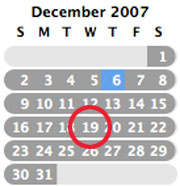The end of the semester
 Two weeks from today Fall semester 2007 will be officially over. I'll be wrapping up grading of four classes: two sections of Intro to Visual Communication plus Media Design and Web Publishing I. I'll feel good about the 80-90% of students who pass the classes, or better yet get As and Bs. And I'll lose sleep over the ones who fail.
Two weeks from today Fall semester 2007 will be officially over. I'll be wrapping up grading of four classes: two sections of Intro to Visual Communication plus Media Design and Web Publishing I. I'll feel good about the 80-90% of students who pass the classes, or better yet get As and Bs. And I'll lose sleep over the ones who fail.
Over the years I've been teaching—10 full time and at least 10 more part-time—I've tried to improve how I teach so students do better. I've learned to make my expectations and requirements clear, so students don't say "you never told us you were going to grade us that." I give students progress reports if they're doing poorly at midterm, something the college pushes very strongly. I talk to students individually if I think they're struggling for one reason or another. I write notes on assignments and send emails suggesting that maybe we should talk about how they're doing in class. But there are always a few who don't succeed.
I know that I can't make anyone do anything. Students have to make the commitment and do the work. But when a student fails a class I often feel that I should have, could have done something better. I should have been funnier, more engaging in class to get them enthused about the subject. I should have pushed them harder when they turned in weak assignments, or maybe encouraged them more when they did well.
Every teacher I've ever talked to hates grading. It's a lot of work to do well, and it takes an emotional toll. Do you focus on the details (assignment scores, etc.) or look at the bigger picture (progress over the course of the semester)? Do you measure work against other students in that class? Or students in previous classes? Or students in similar programs at other schools? Or against some sort of "industry standard" for the field of study? I try to keep all these balls in the air when I determine what is "average" work, probably weighting the performance of other students in that specific class the highest. But there's always room for doubt.
It's such a relief when grading is finished, although these days there's always the possibility of an anguished (or angry) email arriving a few days later, just in time to spoil the holidays.
On the other hand, one of the greatest things about teaching—aside from summer vacation—is that a new semester will start soon. New students, maybe new classes. Another change to get it right.
Top |
|
![]()